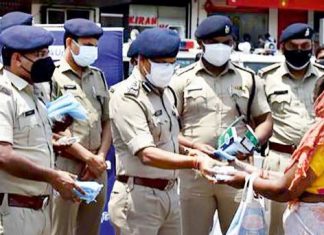
There is a flood of illegal trade in East Mumbai. Foreigners, like the ones coming from Nigeria, are found to be at the forefront. They come to India on a holiday visa and stay on even after it expires. Many illegal acts are also committed by Nigerians and the police have now started tightening the screws.
Police have taken action against 14 Nigerians in Pragati Nagar, east of Nalasopara, under the jurisdiction of Tulinj Police Station under Mira-Bhayander, Vasai-Virar Commissionerate. It is reported that this operation has taken place under “Combing Operation Campaign”. It is learned that action was taken on the guidance given by DCP Prashant Wanghude of Circle 3. Police Inspector Rajendra Kamble of Tulinj Police Station, API Sahuraj Ranware, API Dusane, Palande, Sagar Tillekar, Avaghade, PSI Mhaske, Dalvi, Kokate, Patil and others have been involved in this major operation. The operation lasted for 3 hours (4:00 – 7:00 pm) on January 19, 2021, in which 14 Nigerians who were living illegally in India were caught.
 An FIR has been registered against Mango Tikechuku Augustine (27), Olorondo Degi (30), Malachi Ogbona Ngoke (40), Friday Idoco Chinechiweng (38), Uche John Imeka (47), Alirabaki Aida (27), Ethel Nakola U (32), NVK Christopher Onkovo (44), OKK Obina Kenneth (33), Okoro Luke Ukuu (28), Sarganla Ambitrane (24), James Chukwaji (54) and Yao Amid (26) at Tulinj Police Station under Section 14 of the Foreign Civil Act 1946 and Section 12 (a) of the Passport Act, as they have been staying illegally after their visa expired. Nigerians living in such an illegal manner can easily do illicit business. The police are furthering their investigation against them.
An FIR has been registered against Mango Tikechuku Augustine (27), Olorondo Degi (30), Malachi Ogbona Ngoke (40), Friday Idoco Chinechiweng (38), Uche John Imeka (47), Alirabaki Aida (27), Ethel Nakola U (32), NVK Christopher Onkovo (44), OKK Obina Kenneth (33), Okoro Luke Ukuu (28), Sarganla Ambitrane (24), James Chukwaji (54) and Yao Amid (26) at Tulinj Police Station under Section 14 of the Foreign Civil Act 1946 and Section 12 (a) of the Passport Act, as they have been staying illegally after their visa expired. Nigerians living in such an illegal manner can easily do illicit business. The police are furthering their investigation against them.
“Nigerian 419 Scam is one of the most common crimes taking place in India for the past several years. People should be aware of such fraudsters and should not fall into their web. This is a new way to cheat the public by using advanced IT technology. It is rampant nowadays,” said a police officer attached to the Combing Operation Campaign.
 Such criminals are called Nigerian scammers, and 419 refer to Article 419 of Nigeria’s Criminal Code Section 419. It states: “Any person who by any false pretence, and with intent to defraud, obtains from any other person anything capable of being stolen, or induces any other person to deliver to any person anything capable of being stolen, is guilty of a felony, and is liable to imprisonment for three years.” This particular section, as you can see, deals with the menace of fraud.
Such criminals are called Nigerian scammers, and 419 refer to Article 419 of Nigeria’s Criminal Code Section 419. It states: “Any person who by any false pretence, and with intent to defraud, obtains from any other person anything capable of being stolen, or induces any other person to deliver to any person anything capable of being stolen, is guilty of a felony, and is liable to imprisonment for three years.” This particular section, as you can see, deals with the menace of fraud.
 Scamsters send mass letters, messages and e-mails to defraud greedy recipients who fall prey to their tricks. The offence is also called advance-fee fraud, in which the victim gives money to a stranger after being promised a much larger amount. No money will be given to the victims and they would be further victimised for more payments. The scamster would claim a second or third advance to return the promised money. The modern version of the scam is executed via e-mail correspondence and the criminals will also make up a plausible story to explain as to why a fee is needed in advance.
Scamsters send mass letters, messages and e-mails to defraud greedy recipients who fall prey to their tricks. The offence is also called advance-fee fraud, in which the victim gives money to a stranger after being promised a much larger amount. No money will be given to the victims and they would be further victimised for more payments. The scamster would claim a second or third advance to return the promised money. The modern version of the scam is executed via e-mail correspondence and the criminals will also make up a plausible story to explain as to why a fee is needed in advance.
The e-mail will claim that a few hundred dollars are needed as ‘application fee’ to process the large amount that is won. Another common claim is that the wire transfer of a huge amount is usually possible after an advanced payment fee.
 Victims start losing money, and by the time they realize the fraud, they would have lost their property, too. According to a report, losses from individual scams range between $200 and $12 million. People must be vigilant in not falling prey to such criminals and they should not send money or give credit card, online account details or copies of personal documents to anyone.
Victims start losing money, and by the time they realize the fraud, they would have lost their property, too. According to a report, losses from individual scams range between $200 and $12 million. People must be vigilant in not falling prey to such criminals and they should not send money or give credit card, online account details or copies of personal documents to anyone.
Warning Signs
 You receive a contact out of the blue asking you to ‘help’ someone from another country to transfer money out of their country (e.g. Nigeria, Sierra Leone or Iraq).
You receive a contact out of the blue asking you to ‘help’ someone from another country to transfer money out of their country (e.g. Nigeria, Sierra Leone or Iraq).- The request includes a long and often sad story about why the money cannot be transferred by the owner. This typically involves some type of conflict or inheritance and they may want to move the money straight into your account.
- You are offered a financial reward, such as a share in the amount, for helping them access their ‘trapped’ funds. The amount of money to be transferred, and the payment that the scammer promises to you if you help, is usually very large.
- They will claim that a bank, lawyer, government agency or other organization requires some fees to be paid before the money can be moved. The scamster will often ask you to make payments for the fee via a money transfer service.
 Protect Yourself
Protect Yourself
- Never send money or give credit card details, online account details or copies of personal documents to anyone you do not know or trust.
- Avoid any arrangement with a stranger that asks for upfront payment via money order, wire transfer, international funds transfer, pre-loaded card or electronic currency, like Bitcoin. It is rare to recover money sent this way.
- Never agree to transfer money for someone else. Money laundering is a criminal offence.
- Seek independent advice from someone you know and trust if in doubt.
- If someone is claiming to be from a particular organization, verify the identity of the contact by calling the relevant organization directly – find them through an independent source such as a phone book or online search. Do not use the contact details provided in the message sent to you.
- Do an internet search using the names, contact details or exact wording of the letter/email to check for any references to a scam – many scams can be identified this way.
- If you think it is a scam, do not respond — scamsters will use a personal touch to play on your emotions to get what they want.
- Remember there are no get-rich-quick schemes: if it sounds too good to be true, it probably is.
 Pavan Duggal, who is President at cyberlaw.com, added that in 419 Nigerian Fraud, mail senders ask for some money as processing fee in advance; that is why it is also called as ‘advance fee fraud’. The sender asks the victim to click on the given link for payment and fish out data through a malware attack. To avoid such frauds in future, Duggal suggested people install anti-malware software on their systems and their mobile phones. This anti-malware software is available online, free of charge.
Pavan Duggal, who is President at cyberlaw.com, added that in 419 Nigerian Fraud, mail senders ask for some money as processing fee in advance; that is why it is also called as ‘advance fee fraud’. The sender asks the victim to click on the given link for payment and fish out data through a malware attack. To avoid such frauds in future, Duggal suggested people install anti-malware software on their systems and their mobile phones. This anti-malware software is available online, free of charge.
 Why it is Important to Report a Scam
Why it is Important to Report a Scam
Nigerian scamsters are experts at separating honest people from their money. They invest a lot of time and effort honing their skills and developing the best approaches to manipulate people. If you have been scammed, it is natural to feel embarrassed, but it is more important to report the crime straight away.
 When shame or embarrassment encourages secretive behaviour, it can often lead to victims being scammed repeatedly as they chase good money after bad. If you have been scammed or think you have received a scam email, contact your local police immediately.
When shame or embarrassment encourages secretive behaviour, it can often lead to victims being scammed repeatedly as they chase good money after bad. If you have been scammed or think you have received a scam email, contact your local police immediately.
If you have sent money, you may need to contact your financial institution. The resources listed on the ‘How to Report a Scam Page’, will advise you on how to protect yourself from further attacks.













